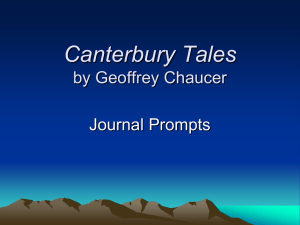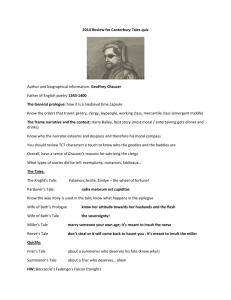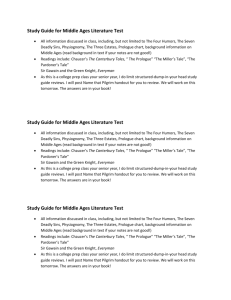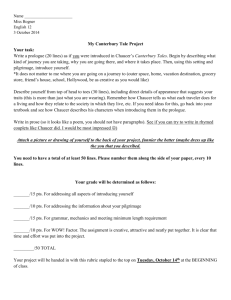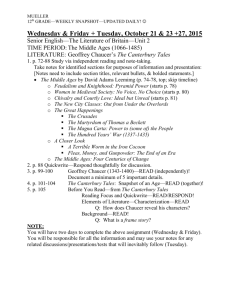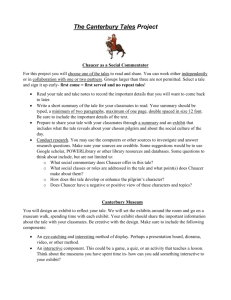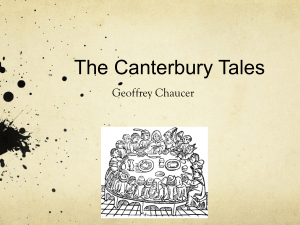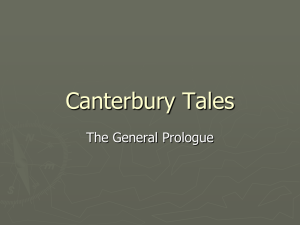Syllabus - Stanford University
advertisement
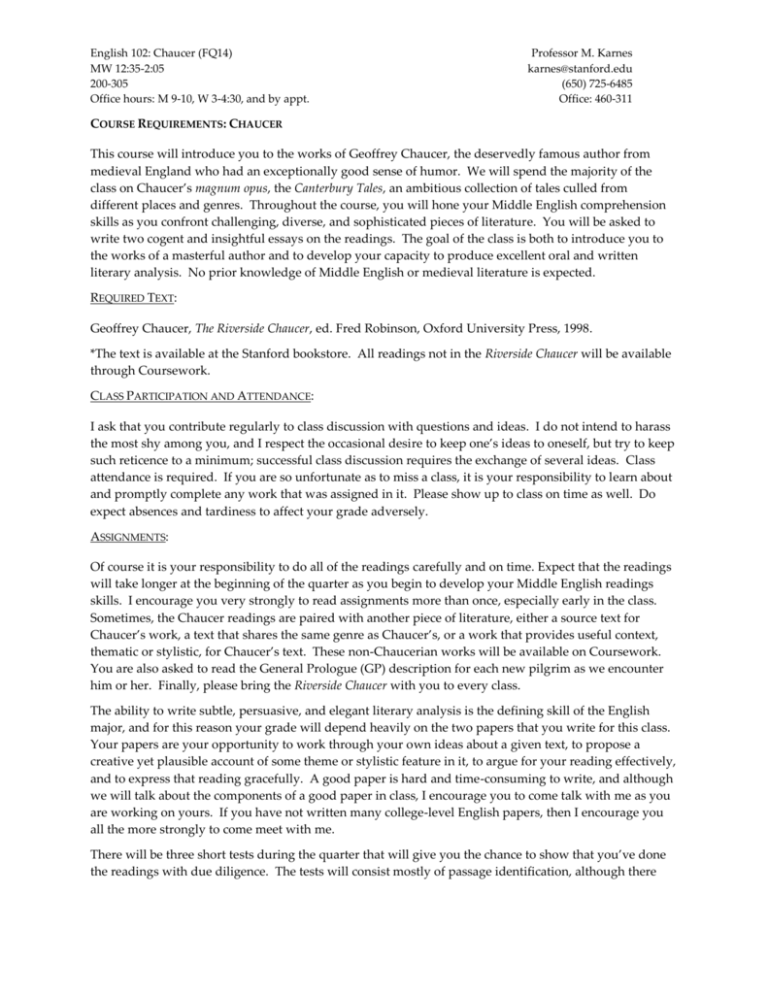
English 102: Chaucer (FQ14) MW 12:35-2:05 200-305 Office hours: M 9-10, W 3-4:30, and by appt. Professor M. Karnes karnes@stanford.edu (650) 725-6485 Office: 460-311 COURSE REQUIREMENTS: CHAUCER This course will introduce you to the works of Geoffrey Chaucer, the deservedly famous author from medieval England who had an exceptionally good sense of humor. We will spend the majority of the class on Chaucer’s magnum opus, the Canterbury Tales, an ambitious collection of tales culled from different places and genres. Throughout the course, you will hone your Middle English comprehension skills as you confront challenging, diverse, and sophisticated pieces of literature. You will be asked to write two cogent and insightful essays on the readings. The goal of the class is both to introduce you to the works of a masterful author and to develop your capacity to produce excellent oral and written literary analysis. No prior knowledge of Middle English or medieval literature is expected. REQUIRED TEXT: Geoffrey Chaucer, The Riverside Chaucer, ed. Fred Robinson, Oxford University Press, 1998. *The text is available at the Stanford bookstore. All readings not in the Riverside Chaucer will be available through Coursework. CLASS PARTICIPATION AND ATTENDANCE: I ask that you contribute regularly to class discussion with questions and ideas. I do not intend to harass the most shy among you, and I respect the occasional desire to keep one’s ideas to oneself, but try to keep such reticence to a minimum; successful class discussion requires the exchange of several ideas. Class attendance is required. If you are so unfortunate as to miss a class, it is your responsibility to learn about and promptly complete any work that was assigned in it. Please show up to class on time as well. Do expect absences and tardiness to affect your grade adversely. ASSIGNMENTS: Of course it is your responsibility to do all of the readings carefully and on time. Expect that the readings will take longer at the beginning of the quarter as you begin to develop your Middle English readings skills. I encourage you very strongly to read assignments more than once, especially early in the class. Sometimes, the Chaucer readings are paired with another piece of literature, either a source text for Chaucer’s work, a text that shares the same genre as Chaucer’s, or a work that provides useful context, thematic or stylistic, for Chaucer’s text. These non-Chaucerian works will be available on Coursework. You are also asked to read the General Prologue (GP) description for each new pilgrim as we encounter him or her. Finally, please bring the Riverside Chaucer with you to every class. The ability to write subtle, persuasive, and elegant literary analysis is the defining skill of the English major, and for this reason your grade will depend heavily on the two papers that you write for this class. Your papers are your opportunity to work through your own ideas about a given text, to propose a creative yet plausible account of some theme or stylistic feature in it, to argue for your reading effectively, and to express that reading gracefully. A good paper is hard and time-consuming to write, and although we will talk about the components of a good paper in class, I encourage you to come talk with me as you are working on yours. If you have not written many college-level English papers, then I encourage you all the more strongly to come meet with me. There will be three short tests during the quarter that will give you the chance to show that you’ve done the readings with due diligence. The tests will consist mostly of passage identification, although there might also be a short essay question. The first test will also include a passage from your reading that you will need to translate into modern English. CONSULTATION: I enthusiastically encourage you to come to office hours to talk about course readings, assignments, or other matters relevant to the course. I will also happily schedule a meeting with you outside my office hours if you are unavailable during them. Short questions are appropriate over email, but please come see me if you have a question that requires more than a 1-2 sentence answer. Do not expect immediate responses to emails: I will respond to all messages that require response within 48 hours. GRADES: Your final grade will be determined by the sum of your work. The papers play the largest role, but class participation will figure prominently as well. Keep all of your work throughout the quarter. First paper Second paper Tests Class Participation 30% 35% 20% 15% STUDENTS WITH DISABILITIES: Students who have a disability that may necessitate an academic accommodation or the use of auxiliary aids and services in a class must initiate the request with the Student Disability Resource Center (SDRC). The SDRC will evaluate the request with required documentation, recommend appropriate accommodations, and prepare a verification letter dated in the current academic term in which the request is being made. Please contact the SDRC as soon as possible: timely notice is needed to arrange for appropriate accommodations. The SDRC is located at 563 Salvatierra Walk (phone 723-1066; TTY 7251067). Its web address is: http://www.stanford.edu/group/DRC/. ACADEMIC INTEGRITY: Any infraction of the honor code, including plagiarism and cheating, will be reported to the Office of Judicial Affairs. According to their website, “For purposes of the Stanford University Honor Code, plagiarism is defined as the use, without giving reasonable and appropriate credit to or acknowledging the author or source, of another person's original work, whether such work is made up of code, formulas, ideas, language, research, strategies, writing or other form(s).” If you are unsure what constitutes plagiarism, it is your responsibility to find out. All students must observe the Honor Code: http://www.stanford.edu/dept/vpsa/judicialaffairs/guiding/honorcode.htm SYLLABUS: CHAUCER M 9/22 Introduction: Chaucer’s life; How to Read Middle English W 9/24 General Prologue, ll. 1-77; 746-858 The Knight’s Tale ll. 859-1354 M 9/29 The Knight’s Tale ll. 1355-1880, 2569-3108 W 10/1 The Miller’s Prologue and Tale; General Prologue (GP) 545-566 “The Butcher of Abbeville” (Coursework) M 10/6 The Reeve’s Prologue and Tale; The Cook’s Tale; GP 587-622 Boccaccio, Decameron IX.6 (Coursework) W 10/8 The Wife of Bath’s Prologue; GP 445-476 Jerome, Adversus Jovinian (Coursework) M 10/13 The Wife of Bath’s Tale Test #1 Andreas Capellanus, The Art of Courtly Love, Selection (Coursework) W 10/15 The Man of Law’s Prologue and Tale; GP 309-330 M 10/20 The Friar’s Prologue and Tale; GP 208-269 Selected anti-fraternal poems (Coursework) W 10/22 The Summoner’s Prologue and Tale; GP 623-668 Vision of the Monk of Evesham (Coursework) M 10/27 The Clerk’s Prologue and Tale ll. 1-784; GP 285-308 W 10/29 The Clerk’s Tale ll. 785-1212g The Merchant’s Prologue and Tale ll. 1213-1576; GP 270-284 M 11/3 The Merchant’s Tale 1577-2417 Genesis 1-3 (Coursework) W 11/5 The Squire’s Introduction and Tale; GP 79-100 Test #2 “The Tale of the Enchanted Horse” from One Thousand and One Nights M 11/10 The Franklin’s Prologue and Tale; GP 331-360 Marie de France, “Lanval” (Coursework) W 11/12 The Pardoner’s Prologue and Tale; GP 669-714 M 11/17 The Prioress’s Prologue and Tale; The Second Nun’s Prologue and Tale; GP 118-162 W 11/19 The Nun’s Priest’s Prologue and Tale Marie de France’s “Cock and Fox” and Le Roman de Renart (Coursework) Nov. 24 and Nov. 26 Thanksgiving Break T 12/6 Book of the Duchess Th 12/8 The Parliament of Fowls Cicero, Dream of Scipio (Coursework) First Paper Due (5-6 pgs) Final Paper Due (6-8 pgs) Test #3
